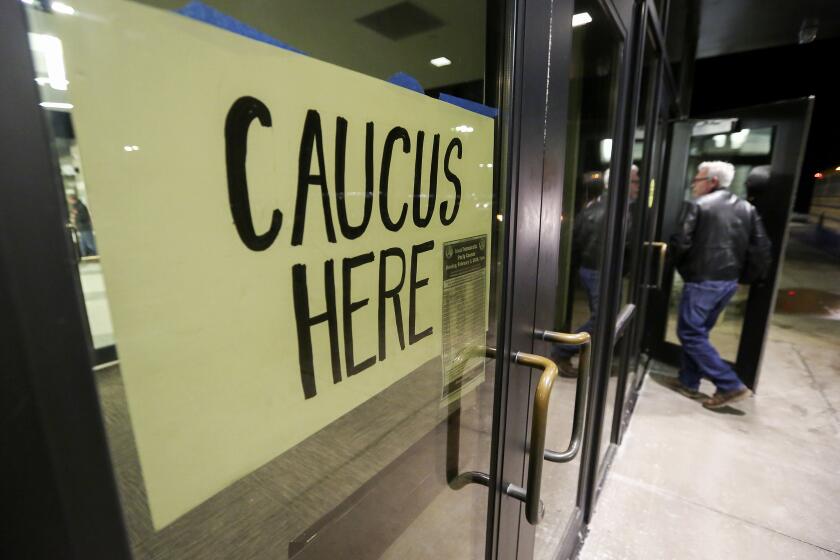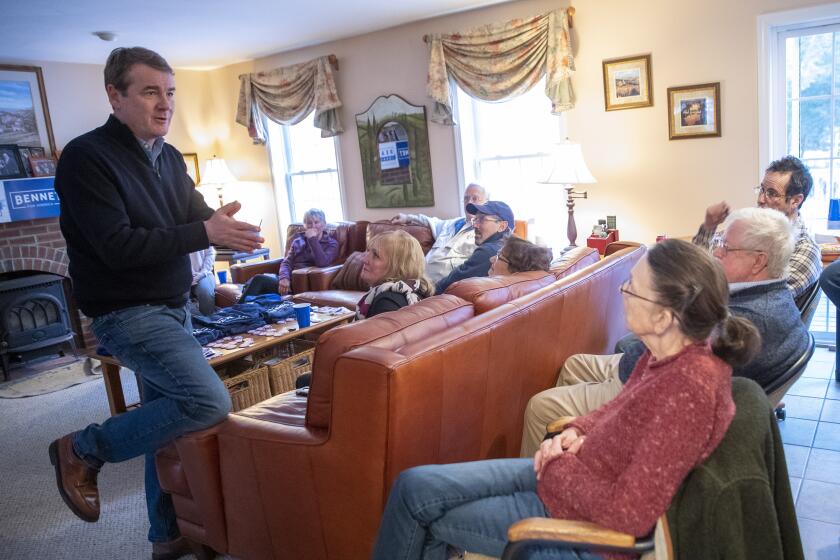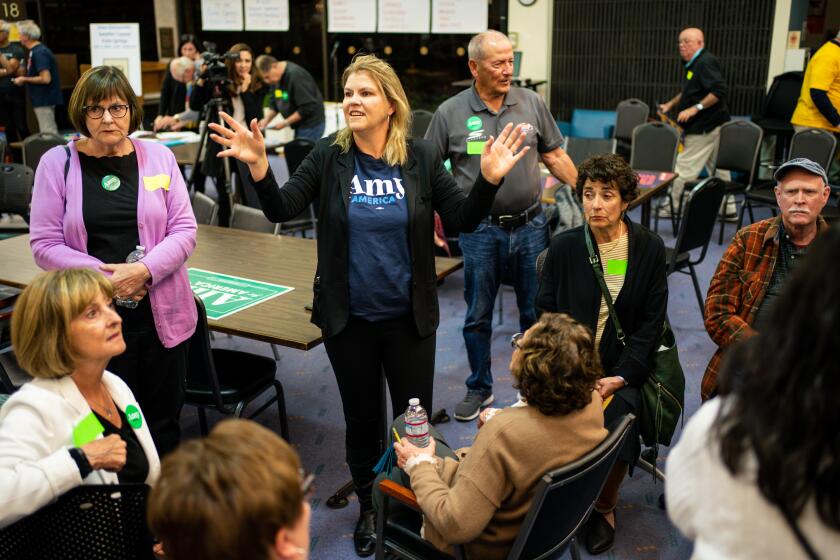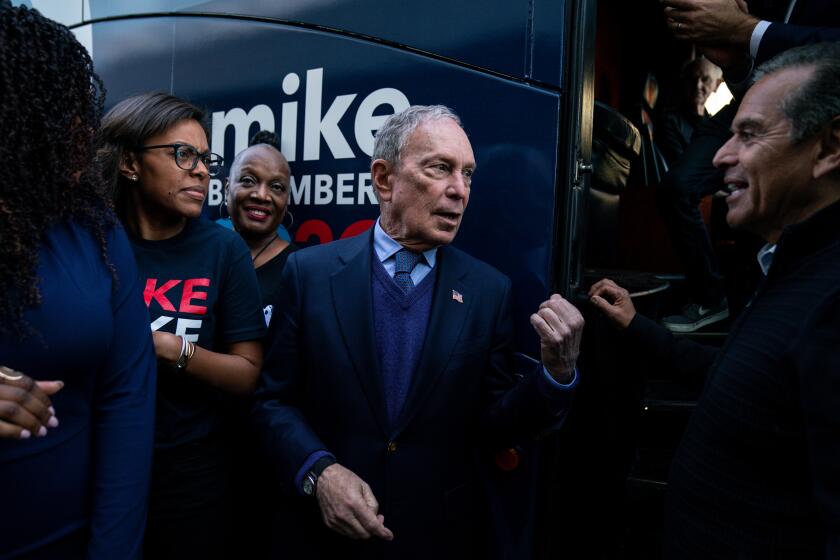Candidates flock to New Hampshire, where stakes have risen after muddle of Iowa caucuses
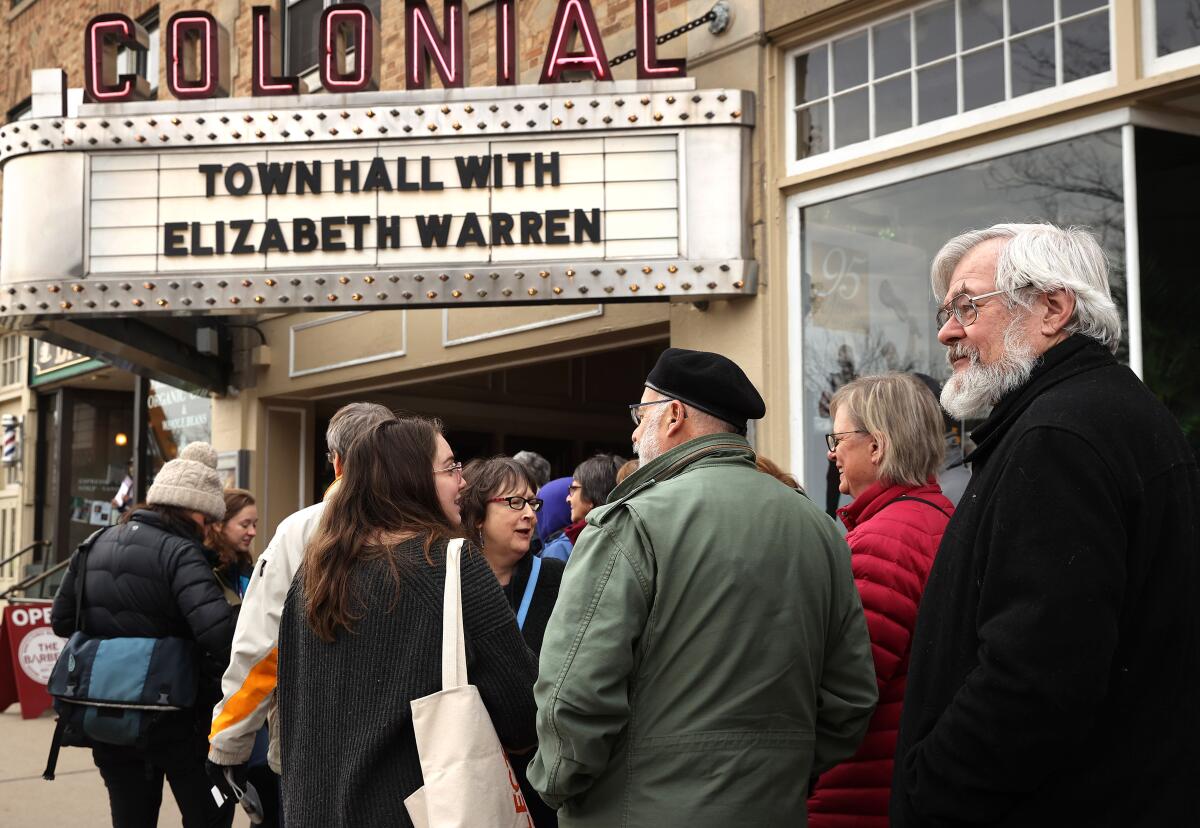
MANCHESTER, N.H. — Democratic presidential hopefuls arrived in New Hampshire before dawn Tuesday for a weeklong primary sprint made more urgent by the vote-counting chaos that left the Iowa caucus results a muddle.
The lack of verified, complete results from the Iowa Democratic Party deprived candidates who had a strong showing — notably Sen. Bernie Sanders of Vermont and Pete Buttigieg, former mayor of South Bend, Ind. — of a moment to bask in victory. The confusion avoided, or at least postponed, a moment of reckoning for those who may not have fared so well, like former Vice President Joe Biden.
The chaos may also have created an opportunity for former New York Mayor Michael R. Bloomberg, who directed aides to double his already massive spending on advertising and increase the size of his campaign staff in the aftermath of the Iowa meltdown, according to campaign officials.
“After more than a year of this primary, the field is as unsettled as ever. No one has made the sale or even come close to it,” said Sabrina Singh, a Bloomberg spokesperson. “Meanwhile, Mike is taking the fight to Trump every day, doubling down on the national campaign strategy we’ve been running from the beginning.”
Bloomberg, a billionaire, has already spent some $300 million of his fortune since entering the race in late November. He has skipped Iowa and New Hampshire in favor of focusing on the larger states that vote later in the process, including California. Aides said he plans to now double his campaign’s paid staff to 2,000 and roughly double his ad purchases.
Late Tuesday, Iowa Democratic officials reported partial results from 71% of precincts, showing Buttigieg and Sanders leading the field, with Sen. Elizabeth Warren in third and Biden lagging behind in fourth place. But the state’s long delay in reporting dashed any hope that its caucuses would help the party winnow its unwieldy field of candidates. That increased the stakes in New Hampshire, which holds its primary Feb. 11, and other states in what now seems even more likely to be a long, contentious nominating process.
Shadow, a tech developer started by veterans of Hillary Clinton’s 2016 presidential run, built the app being blamed for delaying Iowa Democratic caucus results.
In the absence of final results, the campaigns sought to spin the available information as best they could.
At a morning event in Keene, N.H., near the border with Vermont, Warren called the troubles in Iowa a “bumpy start” to the nominating process.
Asked if she was disappointed by the muddled result, Warren said no.
“I’m not disappointed. We came out of Iowa, knowing it is a tight, three-way race at the top, and that the three of us — Buttigieg and Bernie and I — will divide up most of the delegates from Iowa,” she said.
Joanne Desrosreis, an undecided voter who attended Warren’s event, said she had been hoping that the Iowa results would help her make up her mind. “I was waiting for Iowa” to decide between Buttigieg, who is her first choice, and Biden, who she thought would be more likely to win, she said.
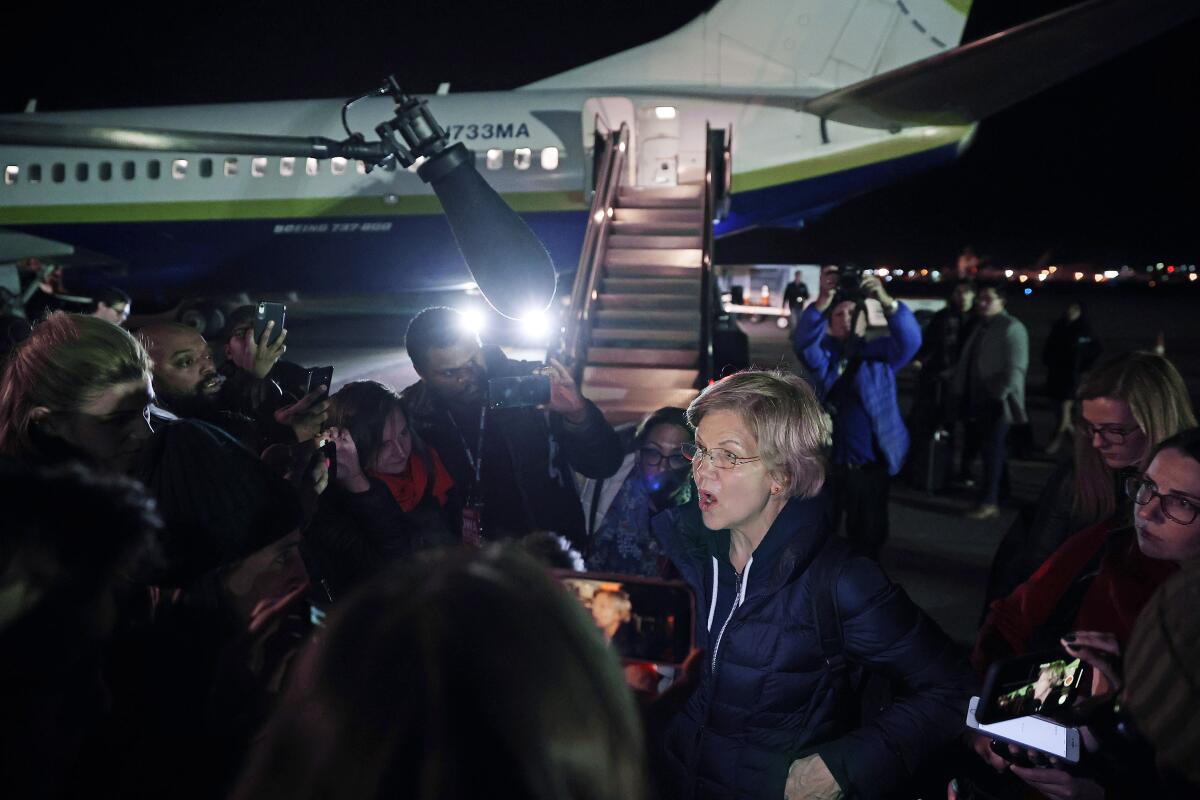
But if Biden turns out to have had a poor showing in Iowa, she said, “I would probably eliminate him.”
Biden, seeking to forestall any such moves, did his best to put a bright face on a mediocre showing.
“We don’t know precisely how many delegates we have and how many we are going to get, but I feel really good about getting more than our fair share,” he told an audience in Nashua, just across the border from Massachusetts.
Late in the day, he seemed to acknowledge that he will need a boost after Iowa, telling a crowd in Concord, “I’d like you to rocket me out of here. If I come out well, you will set the tone for the rest of the race.”
Buttigieg, who held an early morning event to trumpet the backing of the mayor of Nashua, said in an interview on CBS that in Iowa he drew support that was both broad and deep.
“If you look at what we were able to do, what happened last night, the fact that our campaign was able to gather support in urban, suburban and rural areas alike — in counties that Hillary Clinton won, counties that Donald Trump won,” he said. “We are thrilled and absolutely consider that a victory.”
The Democratic primary shifts now to New Hampshire. Sen. Michael Bennet, still a longshot, has been there for some time.
The Iowa mess disrupted many Democrats’ expectation that the nomination fight would eventually come down to a two-person contest between the party’s progressive and moderate wings, in the persons of Sanders and Biden.
Neither faction emerged from Iowa ready to coalesce behind a single candidate. The well-funded Warren campaign is staying in the fight with Sanders for progressive voters. Buttigieg and Sen. Amy Klobuchar of Minnesota, who may have outperformed her polls in Iowa, are preventing Biden from consolidating the support of the party’s moderates.
Some Biden backers had hoped he could emerge from Iowa as a clear front-runner. The death of that prospect bodes poorly for him in New Hampshire, where his campaign has invested less time and fewer resources than it did in Iowa over the last month.
The Iowa Democratic party held satellite caucuses across the nation and world Monday in a bid to make the voting process more accessible for Iowans who are temporarily living in other places. One of the biggest satellites outside Iowa was in Palm Springs.
Biden’s supporters have said they believe he does not have to win either of the first two states because he is in a strong position in the next two to vote — the Nevada caucuses on Feb. 22 and the South Carolina primary on Feb. 29 — as well as in many of the Southern states that vote, along with California, on March 3.
The danger for him is that a weak showing in both Iowa and New Hampshire could prompt voters in the rest of the country to start looking for an alternative, such as Buttigieg or Bloomberg, whose decision to skip Iowa and New Hampshire may have gotten vindication Monday night. His plans for a major escalation of campaign spending were first reported by the Washington Post.
Failing to come out of the gate with early wins undercuts the pillar of Biden’s campaign pitch: that he is the candidate who is best equipped to win against President Trump in the fall.
“Winners win, and losers lose,” said Andrew Smith, a pollster and political scientist at the University of New Hampshire. “How do you know your candidate can win? They win.”
Former New York City Mayor Michael Bloomberg hits Sacramento, Fresno and Compton.
Sanders returned to New Hampshire later than the other candidates, holding an evening rally in Milford where a crowd that campaign aides estimated at well over 1,000 sprawled across three indoor tennis courts. It was the largest crowd Sanders has drawn in New Hampshire this campaign, his aides said.
“I’m very proud to tell you that last night in Iowa we received more votes on the first and second round than any other candidate,” he told them. “For some reason in Iowa they are having a little bit of trouble counting votes. But I am confident that here in New Hampshire they will be able to count your votes on election night. And when they count those votes, I look forward to winning here.”
Some Sanders supporters fumed about the cloud hanging over what they believe was an Iowa victory.
“We don’t even know who won,” said Mary Murray, a gardener from Goffstown and registered nonpartisan voter who supports Sanders.
“I am inclined to think it’s corrupt. That’s why I am here tonight, because I wanted to come to support Bernie no matter what happened,” she added. Party officials “want to choose who they want to choose,” she added. “I think they are afraid of Bernie’s platform of social justice.”
Indeed, back-to-back Sanders wins will probably fuel establishment anxiety that he is too far to the left to beat Trump. But their efforts to slow him down have so far been for naught.
As voting moves into New Hampshire, a wild card is the Granite State’s more open primary rules: It allows participation by not just registered Democrats but also undeclared voters, like Murray, who make up about 40% of the electorate.
That could potentially make the New Hampshire electorate more moderate than the primarily liberal group of voters who show up at Iowa’s caucuses. Still, Sanders — who is himself an independent — did very well among undeclared voters in the 2016 primary.
There is room for each of the candidates to expand their support because a large share of the electorate here is undecided or lightly committed. A mid-January Granite State Poll found that 49% of Democratic primary voters were still trying to decide whom to support; 20% said they are leaning toward someone; 31% had definitely decided.
More to Read
Get the L.A. Times Politics newsletter
Deeply reported insights into legislation, politics and policy from Sacramento, Washington and beyond. In your inbox three times per week.
You may occasionally receive promotional content from the Los Angeles Times.
